
Search engine optimization (SEO) is an ever-evolving field, and 2025 is set to bring some of the most significant changes yet. As search engines refine their algorithms to improve user experience, businesses must adapt to stay visible. From AI-powered search results to zero-click searches, the landscape is shifting rapidly.
This blog explores the top SEO trends in 2025. and how businesses can leverage these updates for better rankings and organic traffic.
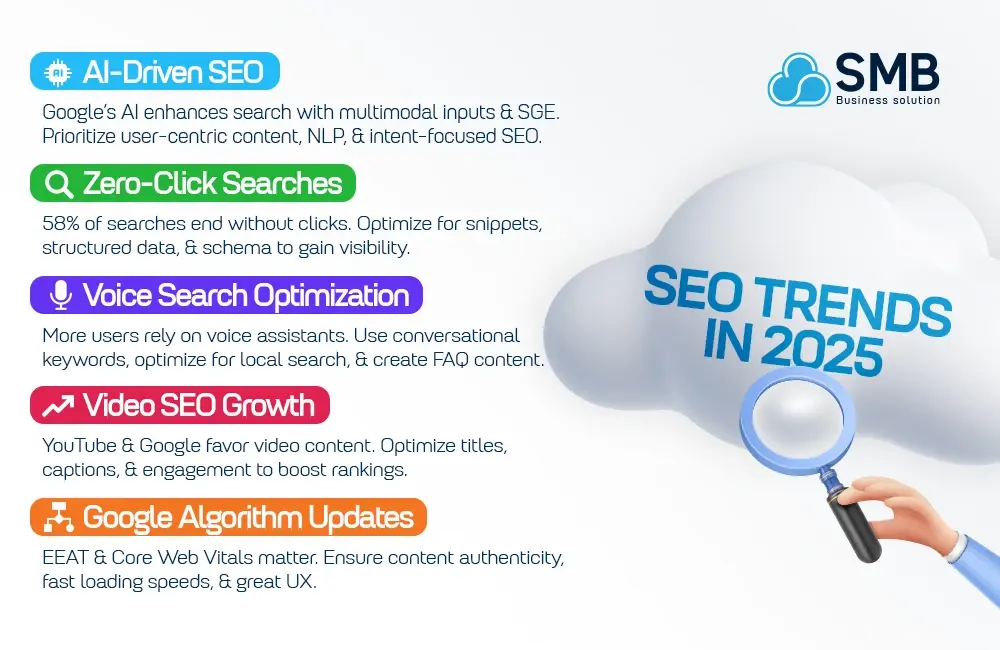
AI is transforming SEO, with Google’s Search Generative Experience (SGE)
leading the way. This shift moves SEO beyond keywords, focusing on context and personalization. Google’s AI now integrates multimodal search, combining text and image inputs, making content optimization more complex.
For example, Google Lens processed 12 billion visual searches per month in 2023, highlighting the need for diverse content formats.
With SGE, search engines assess user behavior, browsing history, and engagement to provide AI-generated overviews. Businesses must adapt by prioritizing:
With featured snippets, knowledge panels, and instant answers, Google is increasingly providing users with information directly on the search engine results page (SERP).
This shift means that fewer users are clicking on traditional organic results, as they can find what they need at a glance.
Recent stats reveal that over 58% of Google searches result in a zero-click.
Zero-click searches are particularly common for informational queries such as weather updates, currency conversions, and definitions. However, they are also growing in commercial searches, where users can see business hours, product pricing, and customer reviews without needing to visit a website.
To stay competitive in this evolving search landscape, businesses must optimize their content to appear in high-visibility SERP features like featured snippets and People Also Ask sections.
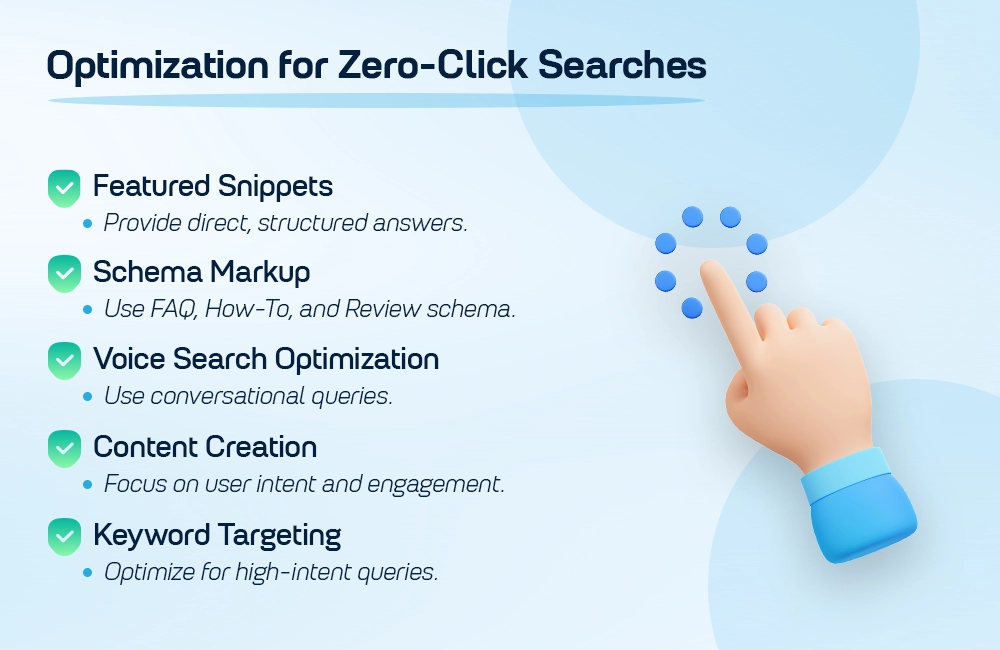
Structure Content for Featured Snippets
Google’s featured snippets extract concise, relevant content from web pages and display them prominently. To improve the chances of appearing in snippets:
Use Structured Data and Schema Markup
Implementing structured data helps Google better understand and categorize your content.
For more details, refer to Google’s official resources on Featured Snippets and FAQ Schema Markup.
With the rise of smart assistants like Google Assistant, Alexa, and Siri, voice search is becoming a dominant factor in SEO.
Studies show that 58% of consumers use voice search to find local businesses, making conversational optimization a necessity. Unlike traditional searches, voice queries are longer and more natural, often phrased as questions.
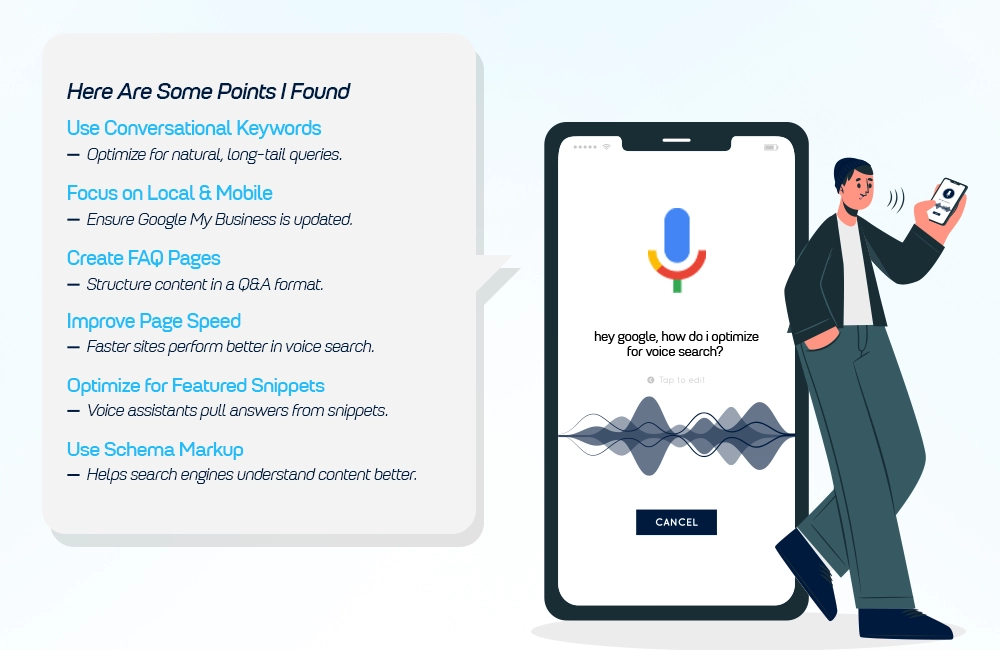
Additionally, with Google’s AI advancements, video search is evolving. Google can now analyze video content to extract key moments, making structured and engaging video content essential for SEO success.
Video content is becoming a crucial factor in SEO rankings, with YouTube being the second-largest search engine. Google is now displaying video snippets directly in SERPs, emphasizing the need for businesses to optimize their video content.
To enhance Video SEO:
Additionally, with Google’s AI advancements, video search is evolving. Google can now analyze video content to extract key moments, making structured and engaging video content essential for SEO success.
Google continually refines its search algorithms to enhance search quality, and in 2025, the emphasis remains on content authenticity, user experience (UX), and Core Web Vitals.
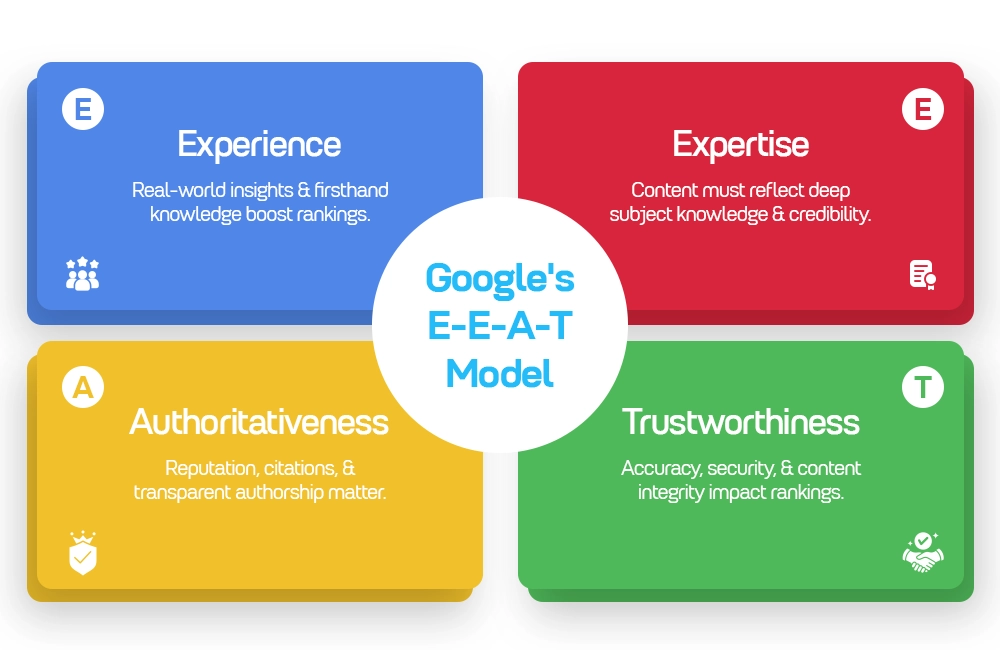
Google's Search Quality Rater Guidelines now emphasize firsthand experience as a critical ranking factor. Content that demonstrates real-world experience, expertise, and credibility is more likely to rank well. This means that AI-generated content lacking human oversight or genuine insights may be deprioritized in search results. Websites that include authorship transparency, citations from authoritative sources, and regularly updated content will gain higher trust signals
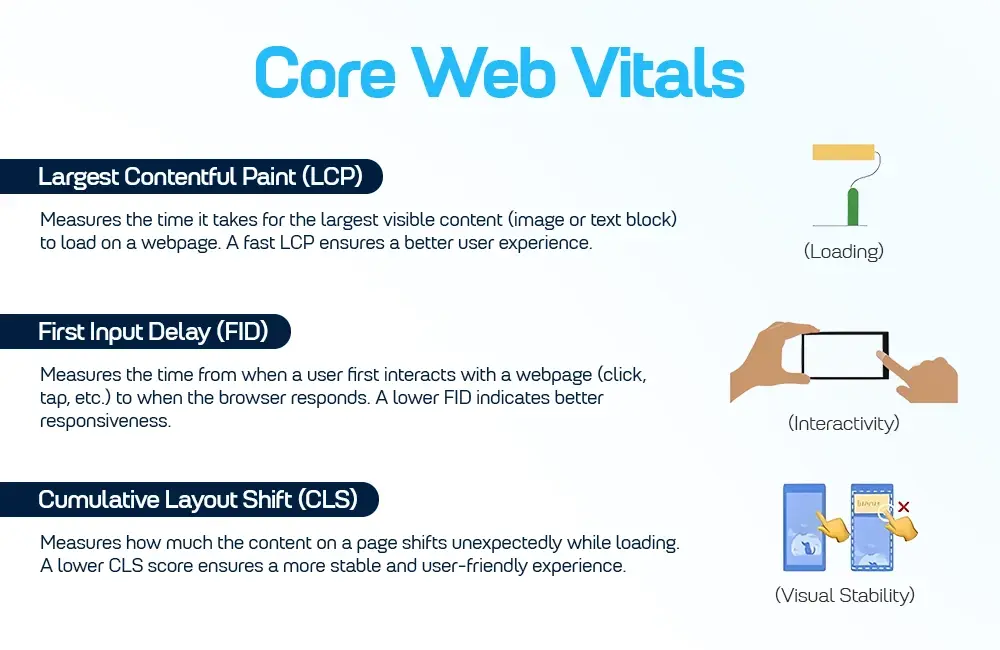
Google's page experience signals continue to influence rankings. Websites that load slowly, have intrusive interstitials, or provide a frustrating user experience will see a drop in rankings. Core Web Vitals—which measure loading performance, interactivity, and visual stability—have become an integral part of Google's ranking factors. Ensuring fast-loading pages, intuitive navigation, and mobile responsiveness is crucial for maintaining search visibility.
SEO in 2025 is no longer just about ranking on Google; it is about providing the best user experience while adapting to the latest search engine trends. Businesses must invest in AI-driven content strategies, optimize for voice and visual search, and improve website user experience to stay competitive. The growing dominance of zero-click searches and AI-powered search algorithms means that traditional SEO techniques need to be revised and replaced with structured data, conversational keywords, and an intent-based approach.
By keeping up with the latest search engine optimization updates and continuously improving content quality, businesses can build long-term digital authority and improve organic reach. The future of SEO is about relevance, personalization, and user engagement—ensuring that your business remains visible and valuable in search results.
Looking to dominate search rankings in 2025? Let’s elevate your digital presence together.
Get a free SEO checklist today!

1: What is AI-driven SEO, and how does it impact rankings?
AI-driven SEO focuses on personalization, context, and user intent rather than just keywords, improving search rankings.
2: What are zero-click searches, and why are they increasing?
Zero-click searches provide instant answers on SERPs, reducing the need for users to visit websites.
3: How can businesses optimize for voice search?
Businesses should use conversational language, long-tail keywords, and structured FAQ content.
4: Why is video SEO important for rankings in 2025?
Google prioritizes video content, displaying key moments in search results for better engagement
5: How do Google’s algorithm updates affect SEO?
Updates focus on EEAT principles, user experience, and Core Web Vitals to rank high-quality content
6: What role does structured data play in SEO?
Structured data helps search engines understand content, increasing visibility in featured snippets.
7: How does NLP (Natural Language Processing) influence SEO?
NLP helps Google interpret search intent, making naturally written content more effective.
8: What is the impact of Core Web Vitals on search rankings?
Fast-loading, mobile-friendly, and user-friendly websites rank higher due to improved experience.
9: How can businesses stay competitive with changing SEO trends?
By adapting to AI, voice search, structured data, and optimizing for user intent.
10: Why is personalization becoming important in SEO?
Search engines prioritize personalized results based on user behavior and preferences.
Copyrights © 2025 SMB Business Solution | All Rights Reserved
Designed & Developed by Digital Hyperlinks (PVT) LTD.